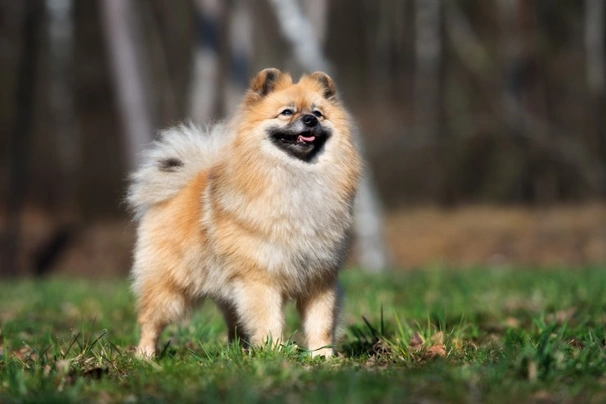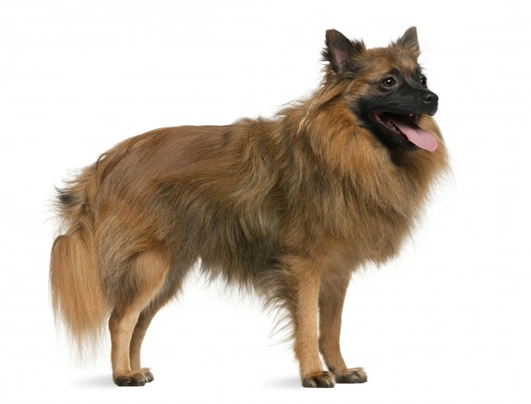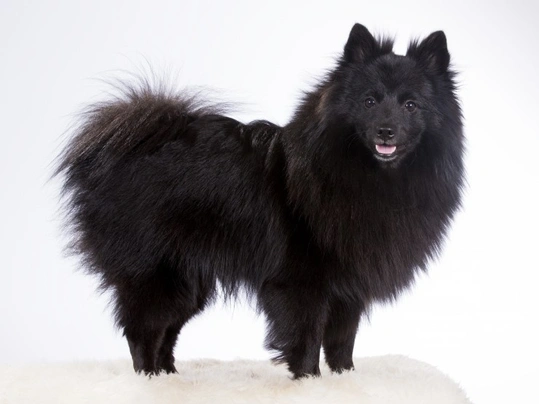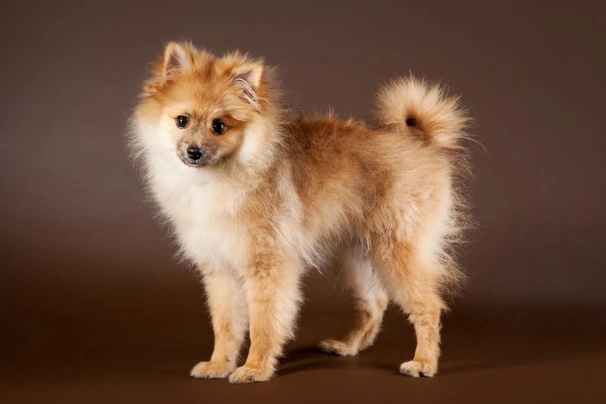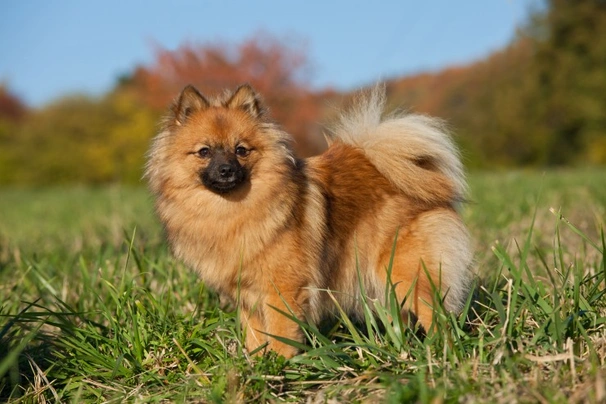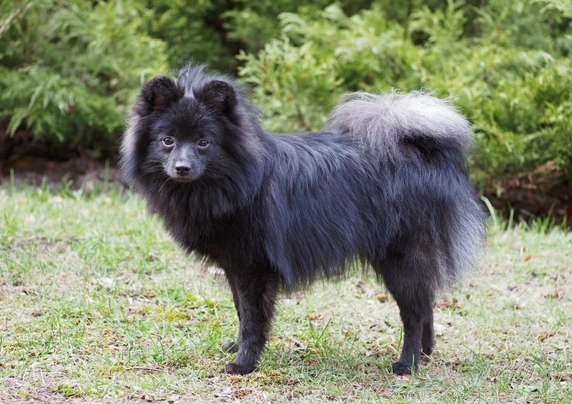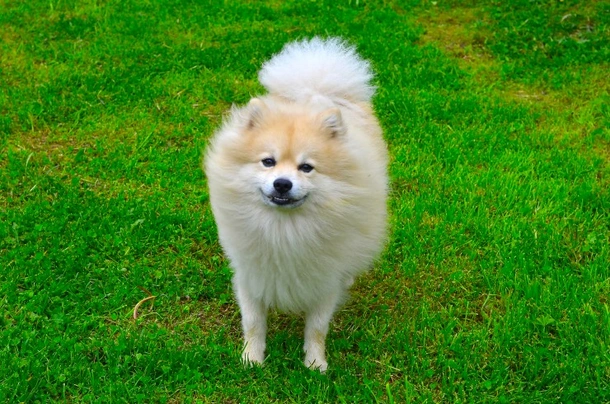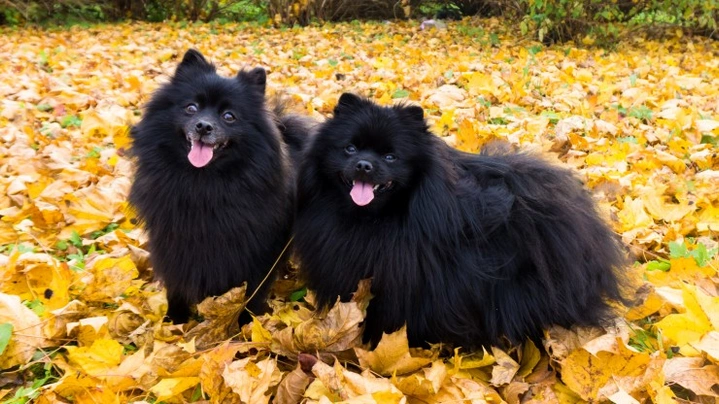German Spitz
Pros
Cons
Introduction of the German Spitz
There are two types of German Spitz with the first being the Klein the smaller dog and the second being the Mittel the larger of the two. Other than the difference in size these two dogs are exactly the same when it comes to looks and temperaments. They were first bred to work in their native Germany but today they have become a very popular choice as family pets and companions thanks to their charming looks and affectionate kind natures. Although they are independent by nature the German Spitz likes nothing more than being part of a family and enjoys being included in everything that goes on in a household.
They are quite high maintenance when it comes to grooming and ideally need to be professionally groomed a few times a year to keep things tidy and looking good. They need to be given quite a bit of exercise and being intelligent dogs they also need to be given lots of mental stimulation on a daily basis for them to be well-rounded happy and well-behaved dogs. In short the German Spitz is an ideal choice for people who have enough time spend with their canine companions.
History of the German Spitz
Spitz-type breeds have been around in Europe for centuries and were used by hunter-gatherers throughout time dating back 6000 years. With this said when it comes to the actual origins of the German Spitz their ancestry can be traced back to the Turfspitz otherwise known as the canis familiaris palustris. The German Northern plains from the Rhine right up to Denmark was a swampy marshland region of the country and people built their houses on stilts. Today these regions are peat bogs where remains of dogs and their owners were discovered when regions were excavated. It is thought that these dogs are the ancestors of the Wolfspitz which were kept by people and bred them to hunt. There are those who believe that these dogs had white coats which was the preferred colour because it meant their owners could tell them apart from wolves.
At one time Germany was divided into smaller dukedoms kingdoms and princedoms and as such many different variety of spitz-type dogs were developed in each region depending on what they were used for. However they all fell under one name which was "Mistbeller" which translates to "dung-hill barker". As such it is thought that these dogs would take up position on muck heaps and bark. Coachmen during the 1800's always had spitz-type dogs travelling with them which would run alongside the carriages or sometimes a dog would ride on a horse's back. At night these dogs would stand guard of both carriages and horses.
It was not until the 18th Century that the German Spitz became popular in England when James I who had a German wife came to the throne. Many German visitors came to court bringing with them the ancestors of the German Spitz we know today. These dogs were soon to become popular and fashionable with ladies and nobles at court being known as Pomeranian because they are thought to have come from Pommern. The dogs back then did not resemble the Pomeranian that we see today being a lot bigger.
It was during the seventeen hundreds that Spitz-type dogs became hugely popular as fashion accessories of British Society with Queen Victoria being a huge fan of the breed although at the time there was some confusion as to whether the dogs she acquired were Pomeranian or Spitz. It is now known they were more likely to be German Spitz (Mittel) dogs. However when Queen Victoria ascended to the throne breeders started to develop smaller and smaller dogs until a toy breed was created which was to become known as the Pomeranian.
The breed's popularity fell at the beginning of the First World War a time when many German breeds fell out of favour in many countries of the world including the UK. In fact right up until 1994 the breed was thought of as "rare" and to a certain extent remains so today because anyone wanting share a home with a German Spitz would need to register their interest with breeders and go on a waiting list for the pleasure of doing so.
Interesting facts about the breed
- Is the German Spitz a vulnerable breed? No they have fast become a popular choice both as a family pet and companion thanks to their adorable looks and willing natures
- Males are known to shed their coats once a year but their female counterparts shed twice a year namely in the spring and then again in the autumn
- There are 2 varieties of German Spitz the Mittel and the Klein
- Although there are two distinct types a Mittel can be as small as a Klein and a Klein can be as big as a Mittel because the two varieties are not "stabilised" as such yet
Appearance of the German Spitz
Height at the withers:
Males 23 – 29 cm Females 18 – 55 cm (Klein)
Males 30 - 38 cm. Females 30 - 38 cm (Mittel)
Average weight:
Males 5 - 8 kg Females 5 - 8 kg (Klein)
Males 7 - 11 kg Females 7 - 11 kg (Mittel)
The German Spitz is a compact dog that boasts having quite a square look about them when seen in profile. They boast largish broad heads with a virtually flat skull and a moderately defined stop. They have long muzzles that are about half the length of their entire head. Noses are black in most dogs but can be self-coloured to match a dog's coat colour too.
Their eyes are oval in shape and medium in size set obliquely on a dog's head but never too far apart. Dogs with black white black/white parti-colours black/tan bi-colours boast having dark eyes whereas other colour varieties may have eyes to match their coats. Ears are triangular in shape and small being set high on a dog's head which they hold perfectly upright.
They boast a perfect scissor bite where their upper teeth neatly overlap their lower ones all nicely set square to a dog's jaws. Lips are black in most dogs but can match a dog’s coat colour too. The German Spitz has a moderately short neck that sits well into their shoulders. Forechests are wide and front legs are straight well boned and strong.
As previously mentioned these dogs are compact and boast having a sturdy body with a short albeit well-developed loin and moderately tucked up bellies. They have a nice level topline and well-rounded ribs. Hindquarters are well muscled with dogs boasting powerful strong back legs. Their feet are cat-like being small and round with toes being well arched. Tails are set high which dogs carry curled from the root but never hold it over their backs.
When it comes to their coat the German Spitz boasts having a double coat that consists of a woolly undercoat and a much harsher top coat. Dogs have more hair around their neck and front quarters which creates a profuse frill. Their front legs boast lots of feathering which tapers from the elbows to a dog's pasterns whereas their back legs are only feathered down to a dog's hocks. Their ears are well covered in soft short hair but the hair around their faces is short and smooth. Their tails are well covered in hair.
The German Spitz can have virtually any colour coat with a variety of markings being acceptable except for any "butterfly" pigment which is not allowed in any colour. The accepted breed colours for Kennel Club registration are as follows:
- Black
- Black & Tan
- Black & White
- Black & White Particolour
- Blue
- Blue & Tan
- Blue & White Particolour
- Blue Sable
- Brown
- Brown & Tan
- Brown & White Particolour
- Brown Sable
- Brown Sable & White
- Cream
- Cream & White
- Cream Sable
- Cream Sable & White
- Gold
- Gold & White Particolour
- Gold Sable
- Lilac
- Lilac & Tan Particolour
- Lilac & White Parti Colour
- Lilac Sable
- Orange
- Orange Sable
- Orange Sable & White
- Orange White Particolour
- Sable
- Sable & White
- White
- Wolf Sable
- Wolf Sable & White
Gait/movement
When a German Spitz moves they do so with purpose without showing any sort of exaggeration in their gait. They move effortlessly in a straight line with a brisk gait always retaining a level top-line.
Faults
The Kennel Club frowns on any exaggerations or departures from the breed standard and would judge the faults on how much they affect a dog's overall health and wellbeing as well as their ability to perform.
Males should have both testicles fully descended into their scrotums and it is worth noting that a dog can be a little lighter or heavier as well as slightly taller or shorter than set out in the Kennel Club breed standard which is only given as a guideline.
Temperament of the German Spitz
The German Spitz is known to be an intelligent fun-loving little dog and one that is a pleasure to own and have around. They might be small in stature but they are always alert and like to be kept busy loving nothing more than being around people. They truly enjoy being involved in everything that goes on in a household and rarely would a German Spitz whether Mittel or Klein show any sort of aggressive behaviour.
They have become popular in the show ring thanks to their charming looks and nice kind natures. However the German Spitz is also known to be an independent little dog which means they need to be taught the "rules" from a young age for them to be truly obedient well-rounded dogs. Puppies must be well socialised and introduced to as many new situations they need to meet as many people and other animals once they have been fully vaccinated as possible too for them to grow up to be outgoing confident and well-rounded mature dogs.
Without the right sort of training and direction these lively little dogs can be a little noisy and are known to like the sound of their own voices which can be a problem for anyone living in an apartment. They are quite adventurous by nature and as such really enjoy being taken out for a walk as often as possible. They also enjoy being able to let off steam in a back garden as often as possible providing the fencing is very secure.
Are they a good choice for first time owners?
German Spitz are the perfect choice for first time dog owners because they are so amenable and people-oriented loving nothing more than to please and to entertain their families. They are particularly good with young children and older people too although playtime can get a bit boisterous at times.
What about prey drive?
Although German Spitz are social by nature they have a very high prey drive and will happily chase anything that moves or tried to run away from them. As such care should always be taken as to where and when a dog can run off the lead more especially if there is wildlife or livestock close by.
What about playfulness?
German Spitz are known to have a very playful side to their natures and love to entertain and be entertained. They are known to be a little mischievous when the mood takes them and being so clever they quickly learn how to get their own way with their silly antics.
What about adaptability?
German Spitz are highly adaptable dogs and providing they are given enough daily physical exercise combined with as much mental stimulation to prevent boredom from setting in they are just as happy living in an apartment in town as they are living in a house in the country.
What about separation anxiety?
German Spitz form strong ties with their families and dogs are never very happy when they find themselves left on their own for longer periods of time. They are better suited to people who either work from home or in households where one person stays at home when everyone else is out so they are never alone for any length of time which could see a dog suffering from separation anxiety. This can lead to them being destructive around the home which is a dog's way of relieving any stress they are feeling and a way to keep themselves entertained. It can also lead to them barking incessantly to get more attention.
What about excessive barking?
German Spitz are known to like the sound of their own voices a little too much which is something that needs to be gently nipped in the bud when a dog is still young being careful not to frighten them. They adore voicing an opinion about anything which can turn into a real problem especially for neighbours.
Do German Spitz like water?
Most German Spitz love swimming and will take to the water whenever they can whether it's in the colder winter months or hotter summer months. However if anyone who owns a dog that does not like water should never force them to go in because it would just end up scaring them. With this said care should always be taken when walking a German Spitz off the lead anywhere near more dangerous watercourses just in case a dog decides to leap in and then needs rescuing because they cannot get out of the water on their own.
Are German Spitz good watchdogs?
Although small a German Spitz is always quick off the mark when it comes to letting an owner know when strangers are about or when something they don't like is going on around them. They love to voice an opinion at the best of times so if there's an excuse all the better. With this said rarely would a dog show any sort of aggressive behaviour when they are "playing" at being a watchdog.
Intelligence / Trainability of the German Spitz
The German Spitz is known to be an intelligent little dog but they are also known to have a bit of a wilful streak in them which means their education and training must start early. They respond extremely well to positive reinforcement but only if there are high value rewards involved. Some dogs excel at many canine sports which includes agility and them even do well when taking part in obedience competitions. In short in the right hands and with the right amount of early socialisation positive reinforcement training the German Spitz is very trainable and a pleasure to have around. With this said their training must be consistent throughout their lives but owners should never expect a German Spitz to be 100% obedient.
German Spitz puppies like all puppies are very cute and they are smart too. As such they can quickly learn as many bad habits as they do the "good". Owners need to start out as they mean to go on when they introduce a new puppy into a home making sure that once they are settled in they are given limits and boundaries. This not only helps establish a pecking order in the home and who is the alpha dog but it also means a dog understands what is acceptable behaviour and what is not. All dogs are much better behaved and happier when they understand what an owner expects of them. As such the first commands that a German Spitz should be taught are as follows to prevent them from developing "small dog syndrome":
- Come
- Sit
- Stay
- Heel
- Quiet
- Leave it
- Down
- Bed
Children and other
When German Spitz are well socialised from a young age and correctly raised they are known to be good around children. However any interaction between a dog and the kids needs to be well supervised to make sure things don't get too boisterous which could result in someone getting scared or hurt.
In general the German Spitz gets on well with other dogs and pets but they need to be introduced carefully to them from a young age. With this said it would be unwise to leave a Spitz alone with any small family pets because their instinct might just get the better of them.
Health of the German Spitz
The average life expectancy of a German Spitz is between 14 and 18 years when properly cared for and fed an appropriate good quality diet to suit their ages.
- They are known to be healthy little dogs although there are a few health concerns worth knowing about if you are hoping to share your home with a German Spitz. The health issues that appear to affect the breed the most include the following:
- Retinal dysplasia (RD) - test available through the British Veterinary Association and Kennel Club
- Multifocal retinal dysplasia (MRD) - test available through the British Veterinary Association and Kennel Club
- Persistent pupillary membranes (PPM) - test available through the British Veterinary Association and Kennel Club
- Progressive retinal atrophy (PRA) - test available through the British Veterinary Association and Kennel Club
- Patella Luxation (slipping stifle)
- Epilepsy
- Mouth and dental issues
What about vaccinations?
German Spitz puppies would have been given their initial vaccinations before being sold but it is up to their new owners to make sure they have their follow-up shots in a timely manner with the vaccination schedule for puppies being as follows:
- 10 -12 weeks old bearing in mind that a puppy would not have full protection straight away but would be fully protected 2 weeks after they have had their second vaccination
There has been a lot of discussion about the need for dogs to have boosters. As such it's best to talk to a vet before making a final decision on whether a dog should continue to have annual vaccinations which are known as boosters.
What about spaying and neutering?
A lot of vets these days recommend waiting until dogs are slightly older before spaying and neutering them which means they are more mature before undergoing the procedures. As such they advise neutering males and spaying females when they are between the ages of 6 to 9 months old and sometimes even when a dog is 12 months old.
Other vets recommend spaying and neutering dogs when they are 6 months old but never any earlier unless for medical reasons. With this said many breeds are different and it is always advisable to discuss things with a vet and then follow their advice on when a dog should be spayed or neutered.
What about obesity problems?
Like a lot of other breeds some German Spitz gain weight after they have been spayed or neutered and it's important to keep an eye on a dog's waistline just in case they do. If a dog starts to put on weight it's important to adjust their daily calorie intake and to up the amount of exercise they are given. Older dogs too are more prone to gaining weight and again it's essential they be fed and exercised accordingly because obesity can shorten a dog's life by several years. The reason being that it puts a lot of extra strain on a dog's internal organs including the heart which could prove fatal.
What about allergies?
Some German Spitz are prone to suffering from allergies and it's important for a dog to see a vet sooner rather than later if one flares up. Allergies can be notoriously hard to clear up and finding the triggers can be challenging. With this said a vet would be able to make a dog with an allergy more comfortable while they try to find out the triggers which could include the following:
- Certain dog foods that contain high levels of grain and other cereal-type fillers
- Airborne pollens
- Dust mites
- Environment
- Flea and tick bites
- Chemicals found in everyday household cleaning products
Participating in health schemes
All responsible German Spitz breeders would ensure that their stud dogs are tested for known hereditary and congenital health issues known to affect the breed by using the following schemes:
- Eye testing through the British Veterinary Association and Kennel Club
What about breed specific breeding restrictions?
Apart from the standard breeding restrictions for all Kennel Club registered breeds currently there are no other breed specific breeding restrictions in place for the German Spitz.
What about Assured Breeder Requirements?
The Kennel Club strongly recommends that all breeders whether KC Assured or not should use the following test on all breeding stock:
Caring for the German Spitz
As with any other breed a German Spitz needs to be groomed on a regular basis to make sure their coats and skin are kept in top condition. They also need to be given regular daily exercise to ensure they remain fit and healthy. On top of this they need to be fed good quality food that meets all their nutritional needs throughout their lives.
Caring for a German Spitz puppy
Like all puppies German Spitz are boisterous and full of life which means it's essential for homes and gardens to be puppy-proofed well in advance of their arrival. A responsible breeder would have well socialised their puppies which always leads to more outgoing confident and friendly dogs right from the word go. With this said any puppy is going to feel vulnerable when they leave their mother and littermates which must be considered. The longer a puppy can remain with their mother the better although it should never be for too long either.
It's best to pick a puppy up when people are going to be around for the first week or so which is the time needed for a puppy to settle in. Puppy-proofing the home and garden means putting away any tools and other implements that a boisterous puppy might injure themselves on. Electric wires and cables must be put out of their reach because puppies love chewing on things. Toxic plants should be removed from flowerbeds and the home too.
Puppies need to sleep a lot to grow and develop as they should which means setting up a quiet area that's not too out of the way means they can retreat to it when they want to nap and it's important not to disturb them when they are sleeping. It's also a good idea to keep "playtime" nice and calm inside the house and to have a more active "playtime" outside in the garden which means puppies quickly learn to be less boisterous when they are inside.
The documentation a breeder provides for a puppy must have all the details of their worming date and the product used as well as the information relating to their microchip. It is essential for puppies to be wormed again keeping to a schedule which is as follows:
- Puppies should be wormed at 6 months old
- They need to be wormed again when they are 8 months old
- Puppies should be wormed when they are 10 months old
- They need to be wormed when they are 12 months old
Things you'll need for your puppy
There are certain items that new owners need to already have in the home prior to bringing a new puppy home. It's often a good idea to restrict how much space a puppy plays in more especially when you can't keep an eye on what they get up to bearing in mind that puppies are often quite boisterous which means investing in puppy gates or a large enough playpen that allows a puppy the room to express themselves while keeping them safe too. The items needed are therefore as follows:
- Good quality puppy or baby gates to fit on doors
- A good well-made playpen that's large enough for a puppy to play in so they can really express themselves as puppies like to do
- Lots of well-made toys which must include good quality chews suitable for puppies to gnaw on bearing in mind that a puppy will start teething anything from when they are 3 to 8 months old
- Good quality feed and water bowls which ideally should be ceramic rather than plastic or metal
- A grooming glove
- A slicker brush or soft bristle brush
- Dog specific toothpaste and a toothbrush
- Scissors with rounded ends
- Nail clippers
- Puppy shampoo and conditioner which must be specifically formulated for use on dogs
- A well-made dog collar or harness
- A couple of strong dog leads
- A well-made dog bed that's not too small or too big
- A well-made dog crate for use in the car and in the home that's large enough for a puppy to move around in
- Baby blankets to put in your puppy's crate and in their beds for when they want to nap or go to sleep at night
Keeping the noise down
All puppies are sensitive to noise including German Spitz puppies. It's important to keep the noise levels down when a new puppy arrives in the home. TVs and music should not be played too loud which could end up stressing a small puppy out and which could affect them for the rest of their lives. In short it could lead to dogs being timid and shy in their adult lives.
Keeping vet appointments
As previously mentioned German Spitz puppies would have been given their first vaccinations by the breeders but they must have their follow up shots which is up to their new owners to organise. The vaccination schedule for puppies is as follows:
- 10 -12 weeks old bearing in mind that a puppy would not have full protection straight away but would only be fully protected 2 weeks after they have had their second vaccination
When it comes to boosters it's best to discuss these with a vet because there is a lot of debate about whether a dog really needs them after a certain time. However if a dog ever needed to go into kennels their vaccinations would need to be fully up to date.
What about older German Spitz when they reach their senior years?
Older German Spitz need lots of special care because as they reach their golden years they are more at risk of developing certain health concerns. Physically a dog's muzzle may start to go grey but there will be other noticeable changes too which includes the following:
- Coats become coarser
- A loss of muscle tone
- German Spitz can either become overweight or underweight
- They have reduced strength and stamina
- Older dogs have difficulty regulating their body temperature
- They often develop arthritis
- Immune systems do not work as efficiently as they once did which means dogs are more susceptible to infections
Older dogs change mentally too which means their response time tends to be slower as such they develop the following:
- They respond less to external stimuli due to impaired vision or hearing
- They tend to be a little pickier about their food
- They have a lower pain threshold
- Become intolerant of any change
- Often an older dog can feel disorientated
Living with a German Spitz in their golden years means taking on a few more responsibilities but these are easily managed and should include taking a look at their diet the amount of exercise they are given how often their dog beds need changing and keeping an eye on the condition of their teeth.
Older German Spitz need to be fed a good quality diet that meets their needs at this stage of their lives all the while keeping a close eye on a dog's weight. A rough feeding guide for older dogs is as follows bearing in mind they should be fed highly digestible food that does not contain any additives:
- Protein content should be anything from 14 – 21%
- Fat content should be less than 10%
- Fibre content should be less than 4%
- Calcium content should be 0.5 – 0.8%
- Phosphorous content should be 0.4 – 0.7%
- Sodium content should be 0.2 – 0.4%
Older dogs don't need to be given the same amount of daily exercise as a younger dog but they still need the right amount of physical activity to maintain muscle tone and to prevent a dog from putting on too much weight. All dogs need access to fresh clean water and this is especially true of older dogs when they reach their golden years because they are more at risk of developing kidney disorders.
Grooming of the German Spitz
The German Spitz has a very profuse coat which in short means they are quite high maintenance in the grooming department. Their coats need to be brushed daily to prevent any tangles or matt from developing. Unlike many other breeds their hair needs to be brushed the "wrong way" and special attention needs to be paid to a dog's ears and their elbows where knots are more likely to form. They also need to have their coats trimmed from time to time and this is best left up to a professional groomer which makes it easier to cope with a German Spitz's coat in between visits to a parlour.
Interestingly males tend to shed just the once a year whereas their female counterparts shed more hair twice a year once in the Spring and then again in the Autumn which is when more frequent brushing is generally necessary.
Exercise of the German Spitz
Although small in stature the German Spitz is an energetic and very intelligent dog. As such they may not need a tremendous amount of physical exercise and they need to be given the right amount of mental stimulation to keep them happy. These little dogs like nothing more than to run around a back garden as often as possible where they can really let off steam. With this said fencing in a garden needs to be very secure so these little dogs can amuse themselves for hours weather permitting.
Feeding of the German Spitz
If you get a German Spitz puppy from a breeder they would give you a feeding schedule and it's important to stick to the same routine feeding the same puppy food to avoid any tummy upsets. You can change a puppy's diet but this needs to be done very gradually always making sure they don't develop any digestive upsets and if they do it's best to put them back on their original diet and to discuss things with the vet before attempting to change it again.
Older dogs are not known to be fussy or finicky eaters but this does not mean you can feed them a lower quality diet. It's best to feed a mature dog twice a day once in the morning and then again in the evening making sure it's good quality food that meets all their nutritional requirements. It's also important that dogs be given the right amount of exercise so they burn off any excess calories or they might gain too much weight which can lead to all sorts of health issues. Obesity can shorten a dog's life by several years so it's important to keep an eye on their waistline from the word go.
Feeding guide for a German Spitz puppy
Puppies need to be fed a highly nutritious good quality diet for them to develop and grow as they should. As a rough guide a German Spitz puppy can be fed the following amounts every day making sure their meals are evenly spread out throughout the day and it's best to feed them 3 or 4 times a day:
- 2 months old - 92g to 155g depending on puppy's build
- 3 months old - 108g to 180g depending on puppy's build
- 4 months old - 114g to 191g depending on puppy's build
- 5 months old - 115g to 194g depending on puppy's build
- 6 months old - 114g to 193g depending on puppy's build
- 7 months old - 92g to 176g depending on puppy's build
- 8 months old - 90g to 158g depending on puppy's build
- 9 months old - 79g to 142g depending on puppy's build
- 10 months old - 79g to 141g depending on puppy's build
Once a puppy is 11 months old they can be fed adult dog food.
Feeding guide for an adult German Spitz
Once fully mature an adult German Spitz must be fed a good quality diet to ensure their continued good health. As a rough guide an adult German Spitz can be fed the following amounts every day:
- Dogs weighing 5 kg can be fed 80g to 93g depending on activity
- Dogs weighing 7 kg can be fed 103g to 119g depending on activity
- Dogs weighing 8 kg can be fed 114g to 132g depending on activity
- Dogs weighing 11 kg can be fed 145g to 166g depending on activity
German Spitz price
If you are looking to buy a German Spitz you would need to pay anything from £300 to over £900 for a well-bred pedigree puppy. The cost of insuring a male 3-year-old German Spitz in northern England would be £20.21 a month for basic cover but for a lifetime policy this would set you back £42.98 a month (quote as of June 2018). When insurance companies calculate a pet's premium they factor in several things which includes where you live in the UK and a dog's age and whether they have been neutered or spayed.
When it comes to food costs you need to buy the best quality food whether wet or dry to feed your dog throughout their lives making sure it suits the different stages of their lives. This would set you back between £40 - £50 a month. On top of this you would need to factor in veterinary costs if you want to share your home with a German Spitz and this includes their initial vaccinations their annual boosters the cost of neutering or spaying your dog when the time is right and then their yearly health checks all of which quickly adds up to over a £900 a year.
As a rough guide the average cost to keep and care for a German Spitz would be between £70 to £100 a month depending on the level of insurance cover you opt to buy for your dog but this does not include the initial cost of buying a well-bred healthy Kennel Club registered pedigree German Spitz puppy.
Buying advice
When visiting and buying any puppy or dog there are many important things to consider and questions to ask of the breeder/seller. You can read our generic puppy/dog advice here which includes making sure you see the puppy with its mother and to verify that the dog has been wormed and microchipped.
German Spitz have become a popular breed both in the UK and elsewhere in the world which means that well-bred puppies command a lot of money. As such with German Spitz there is specific advice questions and protocols to follow when buying a puppy which are as follows:
- Beware of online scams and how to avoid them. You may see online and other adverts by scammers showing images of beautiful German Spitzpuppies for sale at very low prices. However the sellers ask buyers for money up front before agreeing to deliver a puppy to a new home. Potential buyers should never buy a puppy unseen and should never pay a deposit or any other money online to a seller. You should always visit the pet at the sellers home to confirm they are genuine and make a note of their address.
- As previously touched upon German Spitz have become a popular breed in the UK. As such there are many amateur breeders/people who breed from a dam far too often so they can make a quick profit without caring for the welfare of the puppies their dam or the breed in general. Under Kennel Club rules a dam can only produce 4 litters and she must be between a certain age to do so. Anyone wishing to buy a German Spitz puppy should think very carefully about who they purchase their puppy from and should always ask to see the relevant paperwork pertaining to a puppy's lineage their vaccinations and their microchipping.
- Prospective owners should be very careful when considering buying an extra small puppy because all too often they suffer from very serious health issues and no responsible breeder would purposefully breed dogs so they are too small. They should also make sure that both parent dogs have been tested for all the relevant health issues which includes an up to date eye certificate (BVA/ISDS) and ask if either the sire or dam suffers from slipping patellas.

Beautiful german spitz
£800
German spitz Klein for sale
£600
